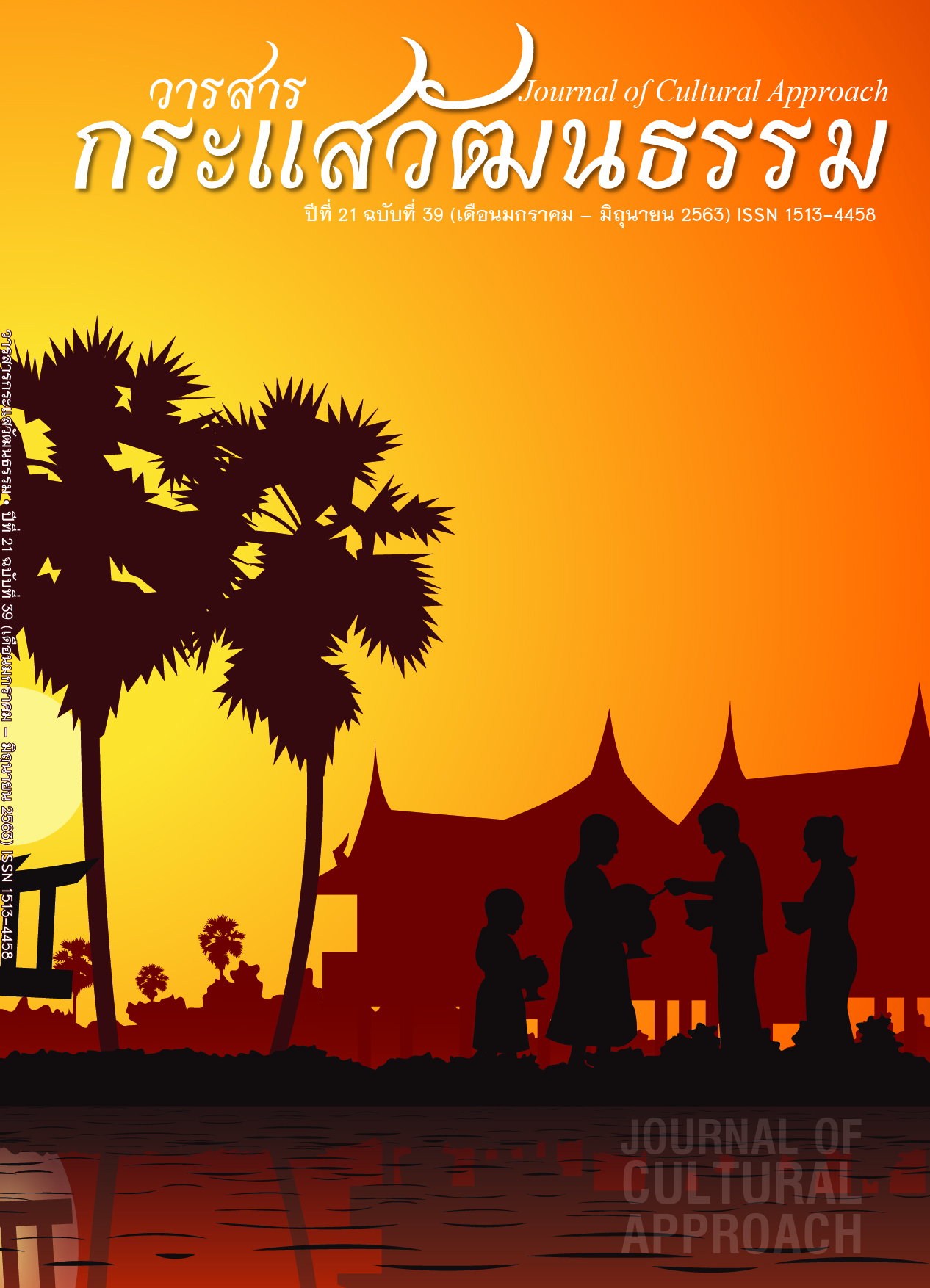แนวทางการพัฒนาการท่องเที่ยวด้านอาหารภาคใต้เชิงสร้างสรรค์แบบบูรณาการอย่างยั่งยืนใน จังหวัดสุราษฎร์ธานี ประเทศไทย
Main Article Content
บทคัดย่อ
การวิจัยครั้งนี้ มีวัตถุประสงค์ 1) เพื่อตรวจสอบทรัพยากรท่องเที่ยวด้านอาหาร จังหวัดสุราษฎร์ธานี ประเทศไทย 2) เพื่อวิเคราะห์จุดแข็ง จุดอ่อน โอกาส และอุปสรรคของการพัฒนาการท่องเที่ยวด้านอาหารภาคใต้เชิงสร้างสรรค์แบบบูรณาการอย่างยั่งยืนในจังหวัดสุราษฎร์ธานี ประเทศไทย 3) เพื่อสร้างแนวทางการพัฒนาการท่องเที่ยวด้านอาหารภาคใต้เชิงสร้างสรรค์แบบบูรณาการอย่างยั่งยืนในจังหวัดสุราษฎร์ธานี ประเทศไทย โดยผู้วิจัยใช้การวิจัยเชิงคุณภาพ เครื่องมือที่ใช้ในการศึกษา คือ แบบรายงานการศึกษาชุมชน แบบตรวจสอบทรัพยากรการท่องเที่ยว และแบบสัมภาษณ์เชิงลึก
ผลการวิจัยพบว่า 1) จังหวัดสุราษฎร์ธานี มีสถานที่ท่องเที่ยวและกิจการด้านอาหารที่สำคัญมากมาย ได้แก่ บริเวณชายฝั่งทะเลอ่าวไทย อุทยานแห่งชาติเขาสก เทศกาลอาหารจังหวัดสุราษฎร์ธานี งานหอยนางรมกาญจนดิษฐ์ มหกรรมสินค้า OTOP เป็นต้น รวมทั้งยังมีบริการด้านที่พักและการให้ข้อมูลแก่นักท่องเที่วที่ไว้รับรองนักท่องเที่ยวทั้งชาวไทยและชาวต่างชาติ เช่น โบร์ชัวร์ แผนที่ หรือป้ายเส้นทาง
2) ผลการวิเคราะห์ SWOT ที่มีความสำคัญในการกำหนดแนวทางการพัฒนาการท่องเที่ยวด้านอาหาร จุดแข็งคือเป็นจังหวัดที่ตั้งอยู่กลางภูมิภาคเอเชียตะวันออกเฉียงใต้ ซึ่งเป็นศูนย์กลางของเศรษฐกิจโลก วัฒนธรรมอาหารมีเอกลักษณ์สามารถสร้างชื่อเสียงและจุดขายระดับครึ่งโลก จุดอ่อนคือ ผลผลิตอาหารจากเกษตรกรรมไทยมีสารเคมีหรือยากำจัดศัตรูพืชตกค้าง รวมทั้งการขาดความร่วมมือประสานงานระหว่างหน่วยงานด้านอาหารและการท่องเที่ยว และขาดบุคลากรและสถานที่ให้บริการการท่องเที่ยวเชิงอาหารที่มีมาตรฐาน โอกาส ได้แก่ ประชากรโลกมีความต้องการอาหารเพิ่มขึ้น เทคโนโลยีนวัตกรรมเปิดโอกาสให้เพิ่มประสิทธิภาพการผลิตด้านเกษตรและอาหารได้ และอุปสรรค คือ มีคู่แข่งเป็นประเทศส่งออกอาหารที่มีต้นทุนการผลิตและค่าแรงงานต่ำ
3) ผู้วิจัยนำเสนอแนวทางการพัฒนาการท่องเที่ยวด้านอาหารภาคใต้เชิงสร้างสรรค์แบบบูรณาการอย่างยั่งยืนในจังหวัดสุราษฎร์ธานี โดยนำจุดแข็งด้านอาหารใต้มาบูรณาการกับโอกาสต่างๆ ที่ชุมชนได้รับมากำหนดยุทธศาสตร์เชิงรุก ได้แก่ การสร้างแบรนด์สินค้าและบริการด้านการท่องเที่ยวอาหารภาคใต้ แล้วนำจุดอ่อนของชุมชนมาผนวกกับโอกาสด้านการพัฒนาท่องเที่ยวด้านอาหารเชิงสร้างสรรค์เพื่อกำหนดแนวทางการสร้างฐานข้อมูลองค์ความรู้ด้านวัฒนธรรมอาหารใต้
Article Details
Proposed Creative Commons Copyright Notices
1. Proposed Policy for Journals That Offer Open Access
Authors who publish with this journal agree to the following terms:
- Authors retain copyright and grant the journal right of first publication with the work simultaneously licensed under a Creative Commons Attribution License that allows others to share the work with an acknowledgement of the work's authorship and initial publication in this journal.
- Authors are able to enter into separate, additional contractual arrangements for the non-exclusive distribution of the journal's published version of the work (e.g., post it to an institutional repository or publish it in a book), with an acknowledgement of its initial publication in this journal.
- Authors are permitted and encouraged to post their work online (e.g., in institutional repositories or on their website) prior to and during the submission process, as it can lead to productive exchanges, as well as earlier and greater citation of published work (See The Effect of Open Access).
Proposed Policy for Journals That Offer Delayed Open Access
Authors who publish with this journal agree to the following terms:
- Authors retain copyright and grant the journal right of first publication, with the work [SPECIFY PERIOD OF TIME] after publication simultaneously licensed under a Creative Commons Attribution License that allows others to share the work with an acknowledgement of the work's authorship and initial publication in this journal.
- Authors are able to enter into separate, additional contractual arrangements for the non-exclusive distribution of the journal's published version of the work (e.g., post it to an institutional repository or publish it in a book), with an acknowledgement of its initial publication in this journal.
- Authors are permitted and encouraged to post their work online (e.g., in institutional repositories or on their website) prior to and during the submission process, as it can lead to productive exchanges, as well as earlier and greater citation of published work (See The Effect of Open Access).
เอกสารอ้างอิง
Apirath Bunnag. (2014). The Factors Affecting on the Southern Food Consumption of Thai Tourists. Journal of Cultural Approach, 15(28), 3–14.
Aumporn Lincharearn. (2011). Qualitative Data Analysis Techniques. Facultyof Education, Naresuan University.
Berninger, V. W., Abbott, R. D., Abbott, S. P., Graham, S., & Richards, T. (2002). Writing and Reading: Connections between Language by Hand and Language by Eye. Journal of Learning Disabilities, 35(1), 39–56.
Chang, R. C. Y., Kivela, J., & Mak, A. H. N. (2010). Food Preferences of Chinese Tourists. Annals of Tourism Research, 37(4), 989–1011.
Developing Learning Process Model. (2011). Community Education Knowledge and Local Wisdom. Faculty of Education, Pibulsongkram Rajabhat University.
Fields, D. L. (2002). Taking the Measure of Work: A Guide to Validate Scales for Organizational Research and Diagnosis. Retrieved from http://www.worldcat.org/oclc/37580676
Hjalager, A. M., Corigliano, M. A. (2000). Food for Tourists: Determinants of An Image. International Journal of Tourism Research, 2, 281–293.
Jureerat. (2013). Southern Food Information. Retrieved October 29, 2016, from http://oknation.nationtv.tv/blog/southernfoods/2013/03/23/entry–2
Kim, Y., Eves, A., & Scarles, C. (2009). Building A Model of Local Food Consumption on Trip and Holidays: A Grounded Theory Approach. International Journal of Hospitality Management, 3, 423–431.
Ministry of Tourism and Sports. (2016). Statistics and Tourism Economy. Retrieved February 27, 2018, from http://www.mots.go.th/more_news.php
Pakawadee Phugan & Soratworachum Inket. (2006). The Food Sets of Phitsanulok Indigenous. Journal of Cultural Approach, 17(32), 3–16.
Suphang Chantavanich. (2010). Qualitative Data Analysis. Bangkok: Chulalongkorn University Press.
Suphang Chantavanich. (2013). Qualitative Research Methods. Bangkok: Chulalongkorn University Press.
Surat Thani Provincial Development Strategy Group. (2018). Report Summary. Retrieved January 17, 2018, from http://123.242.172.6/yuttasat/
Surat Thani Provincial Statistical Office. (2013). Information. Retrieved October 29, 2016, from http://surat.nso.go.th
Surat Thani Travel Guide. (2016). Tourist Attractions. Retrieved October 29, 2016, from http://www.chillpainai.com/guide


